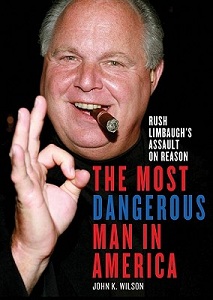 |
|
 |
|
 |
 |
 |
 |
 |
 |
 |
 |
 |
 |
| 2016 Election: | Hillary's book | Trump's book | Bernie's book | Ted Cruz's book | | | 2016 Senate Debates |
The Most Dangerous Man in America Rush Limbaugh's Assault on Reason by John K. Wilson  (Click for Amazon book review)
BOOK REVIEW by OnTheIssues.org: This book starts out as a reasonable analysis of Rush Limbaugh's political influence, including how he created the industry of political talk radio. But it degrades into Rush-bashing, and hence loses its effectiveness as a good biographical source. The author, John K. Wilson, has published six other political books, including one we have reviewed, The Improbable Quest, about Barack Obama. The Obama biography was clearly from the perspective of a supporter, but was a solid biography without too much bias. This Rush Limbaugh biography fails the test of unreasonable bias. By the middle of the book, the author has fully degraded into name-calling: "Limbaugh's bizarre suggestion [blaming 2006-2008 high gas prices on Democratic policy] falls somewhere into that shady area between insanity and stupidity," emotes the author on p. 128. First, that suggestion is not "bizarre" -- it's a restatement of a standard Republican call for more domestic oil drilling. Sure, most liberals would certainly disagree, but it is not "bizarre", which implies that no one else would think anything like that, whereas in fact many conservatives do think that. And it is not "insane" or "stupid" even if one disagrees -- that's just name-calling. Which makes this book lose its place as a serious biography. Once the author establishes himself as a biased source, the reader is forced to ignore the overly-opinionated parts of the book as nothing more than Rush-bashing. What's left is some solid fact-checking. The author carefully cites evidence refuting some of Rush's oft-repeated claims, and cites Rush continuing to stick to his original line even after the counter-evidence was presented. He does that on everything from Rush's misstatements on "net neutrality" (p. 112) to Rush's miscounting of US forest acreage (p. 138) to Rush's misinterpretation of the Bible's recommendation on taxation (p. 147). If the author had stuck to fact-checking, and presenting case after case of Rush's slim facts in the face of overwhelming counter-evidence, this would have been a fine book. But the solid fact-checking is interspersed with the name-calling, and the reader is left to wade through the nasty Rush-bashing swamp to get to the book's otherwise solid ground. Reading our excerpts, where we focus on the fact-checking parts and omit the Rush-bashing, accomplishes what the author should have done himself. In other words, we recommend skipping the book and reading our excerpts instead, while awaiting a better Rush Limbaugh biography in the future. Readers might wonder, "Who is this book written for?" Clearly not Rush fans, because it's too anti-Rush. So the target must be Rush Limbaugh's detractors -- but who exactly are they? Liberals who oppose Rush's conservatism and just disagree with him on everything? No, they simply don't listen to Rush's radio show. So is the target conservatives who think the Republican Party is hurt by Rush's partisanship? Maybe, but that group, while they might disagree with Rush's methods, certainly appreciate Rush's major contribution of the concept of political radio talk shows, which have so immensely benefitted the rest of the Republican Party. Conclusion: The target is really political pundits like me. Pundits are interested in "fact-checking," which is what this book is good at. It's just too vicious in its language and its personal attacks to be useful for anything else. Pundits are a very small audience, and while we're anxious to read more about Rush, there are better books than this one about Rush, such as Al Franken's book, Rush Limbaugh Is a Big Fat Idiot. Admittedly, Franken's book is just as vicious, but when Franken attacks, the reader laughs -- when Wilson attacks, the reader gets annoyed at Wilson. Certainly, a serious biography of Rush Limbaugh is needed. Wilson wrote this book because, as Rush himself states, "People take me seriously because I am effective." (p.147). Wilson details Rush's effectiveness, both on particular issues and in particular elections. And anyone who acknowledges Rush's listenership -- millions upon millions of dittoheads -- must shed any doubt about Rush's importance. We at OnTheIssues cover Rush Limbaugh because he represents the important class of radio pundit -- we can only weakly cover his competitors (such as Howard Stern, Anne Coulter, and Arianna Huffington) because they just don't have as much material available. A serious Rush Limbaugh biography is warranted -- but this book ain't it. We're happy to see that this book's Amazon ratings are low compared to Franken's book. Wilson's book's Amazon ranking is #1,581,919 in February 2013. Franken's book is #716,797, and is 12 years older (i.e. it far beats the newer book in the rankings, despite having fallen from "in print" status for over a decade. Franken is much more open about name-calling (such as in his title), but works in as much serious criticism as does Wilson. A serious book about Rush would be a welcome addition. But for an anti-Rush screed, Franken's book is much funnier, and more fun to read than forcing oneself through Wilson's anger. -- Jesse Gordon, jesse@OnTheIssues.org, Feb. 2013
Rush Limbaugh's Assault on Reason by John K. Wilson.
| ||||||||||||||||||||||||||||||||||||||||||||||||||||||
| ||||||||||||||||||||||||||||||||||||||||||||||||||||||
Page last edited: Dec 17, 2018